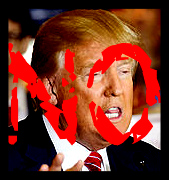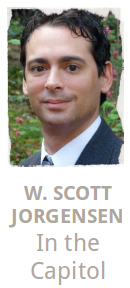
Public figures who have substantial money often make charitable giving a part of their financial picture. It can help at tax time, it can cement relationships in the community (whatever the community may be), it can simply feel good or plainly be intended to do something positive. And charitable donations can help communities.
The list of people, local and national, who give to charities and set up non-profit charitable foundations of their own is vast, and it's a list of people who help our society even while doing good of some sort for themselves.
Donald Trump has a charitable foundation, or at least so it called: It is the Trump Foundation. But you probably will have to look hard to find many other foundations much like it.
Washington Post reporter David Farenthold has been looking into it, and said in an interview on NPR, "Trump hasn't actually given it any of his own money since 2008. Other people have supplied all the money in that time, which you don't normally see with a rich person's private charity. Those things are usually just filled up with a rich person's money. So we wondered, well, why does anybody give money to prop up Donald Trump's personal charity? And we learned an answer to that, which is that in - as you mentioned, in some cases, Trump has people who owe him money either for business dealings or they buy tickets that he has rights to. They pay the Trump Foundation and not Trump himself. Now, you can do that. That's totally legal. But Trump would have to pay income tax on that - those donations because they're his income. He directed where they went. So I'd also like to know - was Trump complying with that law? Was he paying income tax on this money he was sending to his foundation?"
And then there was this: "a lot of the times you see a wealthy person will help one group year after year, one cause - cancer research, for instance, autism research, a particular college or university. There's nothing like that in Trump's foundation. Instead, the main theme in the gifts seems to be that they help Trump's personal life or his business life. Trump owns a lot of facilities, including the Mar-a-Lago Club down in Florida, that do a lot of business with charities that can cost up to $270,000 to rent out - for a charity to rent out Mar-a-Lago for one night. And so you see a lot of cases in which Trump gives - donates money to other people who then just give it back to him by renting out Mar-a-Lago for a lot of money."
There is much, much more. New York state is investigating; whether the Internal Revenue Service is, is unknown.
But that's only one piece of the Trump-charities picture. Trump has said that he's a big donor to charities; he said in May, "I've given millions away."
But a June 28 Farenthold story in the Post story said "Trump promised millions to charity. We found less than $10,000 over 7 years." In his context, that's pocket change.
An article in 2011 by The Smoking Gun said that Trump “may be the least charitable billionaire in the United States.”
And you think this would-be president actually cares about people in the rest of the world? - rs




